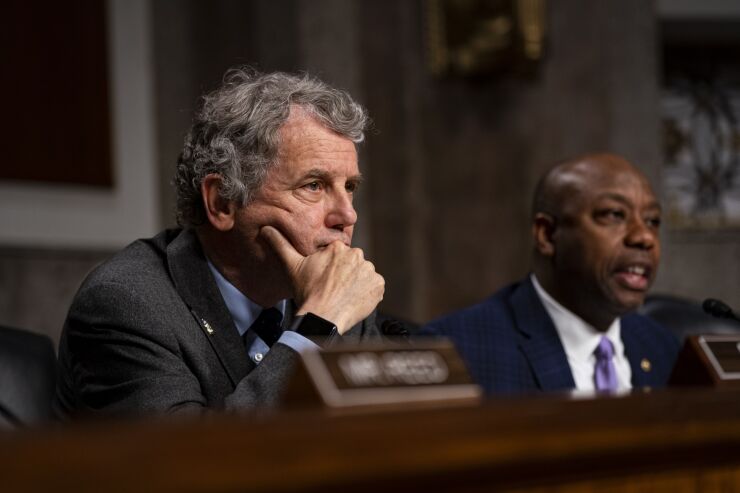
WASHINGTON — The Senate Banking Committee is planning to have a markup on the Secure and Fair Enforcement Act, or SAFE Banking Act, which would make it easier for banks to provide services to legal marijuana businesses, before the end of the month.
The
NBC
The SAFE bill is expected to have enough votes from Republicans and Democrats to pass through the Senate. Forty-two senators currently co-sponsor the legislation, including eight Republicans. Those Republicans include Kevin Cramer of North Dakota, Steve Daines of Montana, Dan Sullivan and Lisa Murkowski of Alaska, Bill Cassidy of Louisiana, Cynthia Lummis of Wyoming, Rand Paul of Kentucky and Susan Collins of Maine.
Nearly a decade after Colorado and Washington state first legalized the substance, legal cannabis companies have been plagued with an overabundance of cash. Major payment companies like Visa and Mastercard have explicit policies preventing their electronic systems from being used to purchase or sell cannabis so long as it remains criminalized at the federal level, and as a result those companies have to do business primarily in cash. That reality is a deterrent for many banks, which would prefer not to take on clients who pose such a significant security risk by dealing so heavily in cash.
Some of those Republican lawmakers come from states where recreational cannabis is still illegal. The final agreement on the bill will have to be narrowly tailored to financial services in order to keep Republicans from deep Red states from abandoning the legislation.
That said, it's still a tricky issue for many Republicans. Sen. Tommy Tuberville, R-Ala., has publicly supported the measures in the SAFE Banking Act, but isn't formally co-sponsoring the legislation after
Senate Majority Leader Chuck Schumer, D-N.Y.,
In 2019 and 2020 the Republican-led Senate did not act on the bill
But the legislation is not likely to get much traction in the House. House Financial Services Committee Chairman Rep. Patrick McHenry, R-N.C., has said it's not a priority for him during his leadership of the committee.
"It's not on my agenda," he said. "I have a focused agenda that because of the turbulence in the banking system just expanded a little bit, but it's not a priority for me," McHenry said at the American Bankers Association Washington Summit in March. "I voted against the bill multiple times in the House."
McHenry has voted against similar efforts in the House, spearheaded by then-Rep. Ed Perlmutter, D-Colo.
"I don't think this is the proper means to solve a societal problem through finance, whether it's putting climate politics on financial institutions or the question of cannabis in society on financial institutions, it doesn't fit in with my view," McHenry said.






